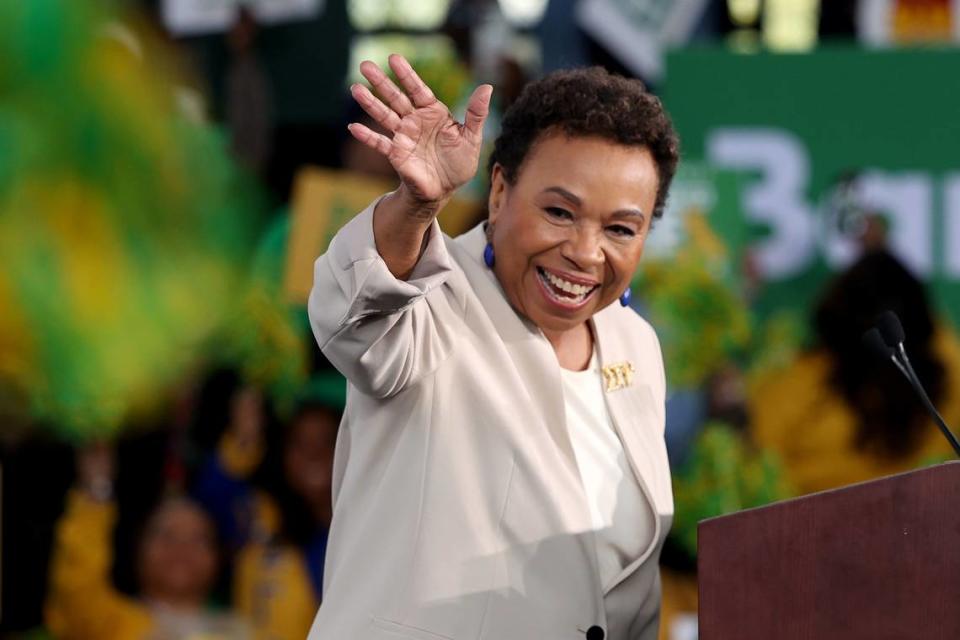The Democrats running for Feinstein’s seat vote the same. A closer look reveals differences

The three California members of Congress running for Sen. Dianne Feinstein’s Senate seat come to the contest with distinctly different political identities.
Barbara Lee is a liberal hero with a lengthy record of fighting what she sees as an overly aggressive, expensive military.
Katie Porter has forged an image as an outspoken outsider, eager to expose corporate abuses and challenge CEOs publicly.
Adam Schiff is the progressive who helped lead battles against President Donald Trump while making sure he delivers for his Los Angeles area district..
Look at their House voting records, however, and it’s difficult to tell them apart.
Lee, D-Oakland, Schiff, D-Burbank and Porter, D-Orange County, received perfect ratings from the AFL-CIO and the Human Rights Campaign in their latest tallies.
Schiff supported President Joe Biden on every key vote last year, said the Congressional Quarterly vote study. Porter was at 98% and Lee at 97%.
Each routinely gets top ratings from the liberal Americans for Democratic Action and on the League of Conservation Voters’ environmental scorecard.
“All three would be great senators in their own way,” said Don Kusler, ADA national director.
The groups’ ratings are nearly identical to those of Feinstein, who got a perfect score from ADA last year. She’s retiring at the end of her current term in January, 2025.
Voting records matter. They’re an easy, understandable way for voters to learn about candidates.
But a deeper look reveals some differences.
Trying to find differences
Congress takes hundreds of votes each year, and there are inevitable differences. But voters don’t usually examine minutiae.
“What matters more is the candidate’s ability to connect with voters in a positive way and make voters see their opponents in a negative way,” said Kambiz Akhavan, executive director of the University of Southern California Dornsife Center for the Political Future.
That will be tough. Porter has been a House member only since 2019, while Lee arrived in 1998 and Schiff in 2001. There are some important votes where the differences were clear. Among them:
▪ Debt limit. Lee and Porter were among 11 California Democrats who opposed the debt limit deal ironed out by President Joe Biden and House Speaker Kevin McCarthy last week.
Schiff joined the state’s other 28 Democrats to back the bill. “The alternative was catastrophe. It was a collapse of our economy, a recession, the loss of millions of jobs for Californians,” he explained. Moody’s Analytics had projected that a prolonged government default would cost the state an estimated 871,000 of its 18 million jobs.
Porter objected to some of the bill’s environmental and climate provisions, including one that could make it easier for fossil fuel projects to proceed.
▪ Criminal justice. In 2021, when there was speculation Schiff could be named California’s attorney general, a coalition of justice reform groups wrote Gov. Gavin Newsom saying that over the years, the congressman was too often a strong supporter of tough incarceration policies.
Marisol Samayoa, spokeswoman for Schiff’s campaign, told The Bee, “Adam is proud of his work to reform our criminal justice system, including passing the single biggest investment in youth crime prevention in California’s history.”
▪ Military issues. Lee and Schiff were House members during the Sept. 11, 2001, terrorist attacks. Schiff voted to give President George W. Bush broad authority three days after the attack to use military force against terrorists. Lee cast the only dissenting vote.
The next year, Lee voted against authorizing the use of military force in Iraq. Schiff voted yes and later said he regretted doing so.
In 2005, Lee and two other California House members founded the Out of Iraq caucus in 2005. The next year, Lee’s proposal barring permanent U.S. military bases in Iraq was passed.
All three candidates have been critics of what they call excessive defense spending. Porter in December said that though she he supported steps to “pay our troops fairly,” and other parts of the latest defense bill, she voted no.
“I’m concerned that these taxpayer dollars will be wasted lining the pockets of big defense contractors,” she said. Lee and Schiff also opposed the bill.
Identical Democrats?
The glut of partisan votes are to a large extent a product of the times. Political polarization over the past 20-odd years has led to a Congress that usually votes on big, comprehensive packages dealing with defense and the budget, and less on bills and amendments focused on more specific items.
As a result, most votes fall along party lines. “The system hasn’t allowed members to express nuances in their positions,” said Pete Sepp, president of the National Taxpayers Union, a conservative group that rates lawmakers.
In President Barack Obama’s first term, for instance, Lee voted with the Democratic president as little as 78% in 2011 and as much as 93% in 2009, according to the CQ study. She was with Biden on 98% of votes in 2021 and 97% last year.
Schiff voted with Obama 90% of the time in 2012, and in other years his backing ranged from 92% to 98%. He was House Intelligence Committee chairman from 2019 to 2023 and was the lead prosecutor in the 2020 Trump impeachment. Schiff has been a 100% backer of Biden, according to the CQ study.
ADA’s Kusler summed up the ratings this way: “Clearly, Lee is the progressive champion in her style, leadership, and rhetoric. That is seen in her voting record too,” he said. “Schiff has been solid left but more mainstream per ADA standards.”
Throughout other ratings, differences are also slight. The National Taxpayers Union, for instance, gave Lee a 13% lifetime rating in 2021, meaning she went along with the NTU’s frugal approach to government 13% of the time.
Porter, who also has fought higher defense spending, was at 11%, while Schiff’s rating was 10%.
Still, said Sepp, “these are modest differences.”

 Yahoo Sports
Yahoo Sports 